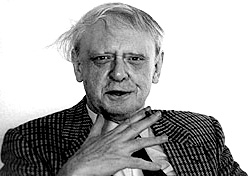Энтони Бёрджесс знаменитые цитаты
„Греки создали самые яркие образы чудовищ, предоставив будущему их материализовать.“
образ
Источник: Железо, ржавое железо
золото
Источник: Железо, ржавое железо
духовность
Источник: Железо, ржавое железо
Энтони Бёрджесс Цитаты о жизни
цветок
Источник: романы
Энтони Бёрджесс цитаты
этаж
Источник: романы
цветы
Источник: проза
„Война учит верить в самое невероятное.“
война
Источник: Железо, ржавое железо
Энтони Бёрджесс: Цитаты на английском языке
Non-Fiction, Homage to QWERT YUIOP: Selected Journalism 1978-1985 (1986)
Fiction, Earthly Powers (1980)
Non-Fiction, Homage to QWERT YUIOP: Selected Journalism 1978-1985 (1986)
Fiction, The Right to an Answer (1960)
Non-Fiction, English Literature: A Survey for Students (1958, revised 1974)
Fiction, Time for a Tiger (1956)
Non-Fiction, Homage to QWERT YUIOP: Selected Journalism 1978-1985 (1986)
“I suppose the only real reason for travelling is to learn that all people are the same.”
Fiction, One Hand Clapping (1961)
Fiction, A Clockwork Orange (1962)
Fiction, Time for a Tiger (1956)
Fiction, Time for a Tiger (1956)
Fiction, Earthly Powers (1980)
People, Joseph Conrad, Edward Heath
Fiction, The Right to an Answer (1960)
Fiction, The Kingdom of the Wicked (1985)
Fiction, Napoleon Symphony (1974)
Fiction, 1985 (1978)
Fiction, The Kingdom of the Wicked (1985)
Fiction, The Enemy in the Blanket (1958)
“If the world is to be improved it must be by the exercise of individual charity.”
Non-Fiction, Here Comes Everybody: An Introduction to James Joyce for the Ordinary Reader (1965)
Fiction, Napoleon Symphony (1974)
Non-Fiction, Here Comes Everybody: An Introduction to James Joyce for the Ordinary Reader (1965)
Fiction, Napoleon Symphony (1974)
Non-Fiction, Homage to QWERT YUIOP: Selected Journalism 1978-1985 (1986)
